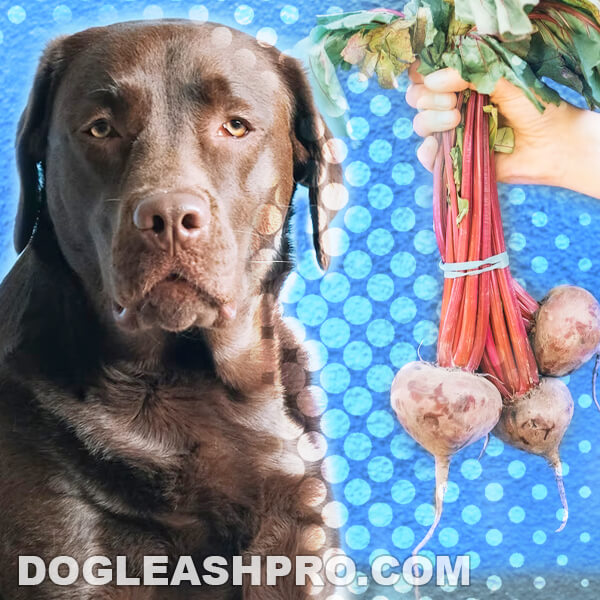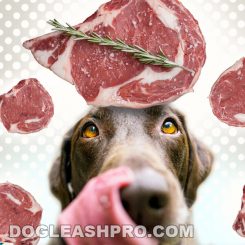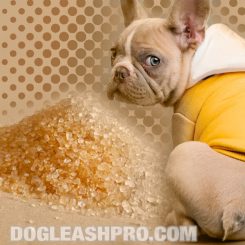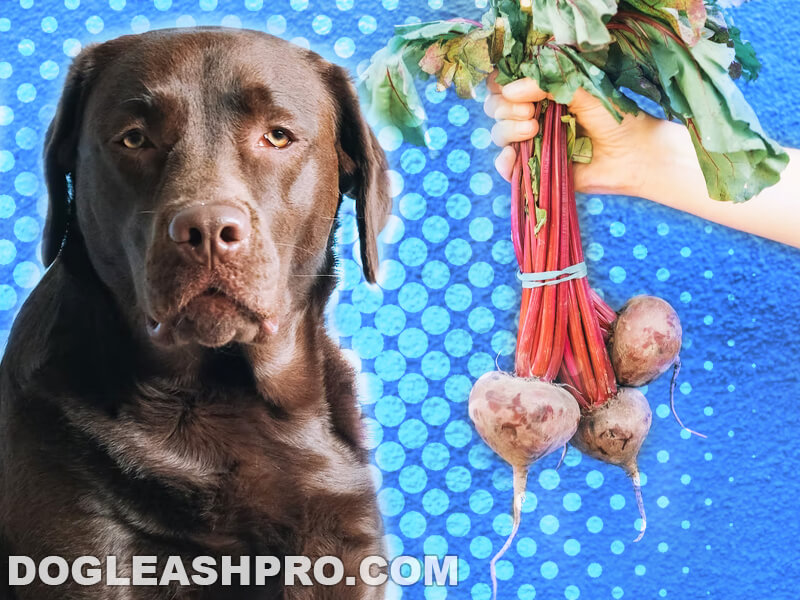
Can dogs eat Beets? Yes, dogs can eat Beets in moderation. This root vegetable is packed full of fiber, potassium, manganese, folate, and vitamin C. Not only will these vitamins and minerals help to maintain healthy skin and coat in dogs but also boost their immune systems and improve their gut health. Make sure your dogs aren’t allergic to Beets first before feeding them.
Beets are sweet and tasty and provide us with tons of health benefits. But can dogs eat Beets? If you’ve ever wondered, “can my dog eat Beets?” then you’ve come to the right article. In this article, we’ll discuss in-depth how this powerful vegetable is good and bad for dogs and how to properly prepare Beets for canine consumption.
Table of Contents
Can dogs have Beets?

Yes, dogs can have Beets in moderation. Can dogs have Beets in their diet? While Beets are a great addition to your dog’s diet, it’s best to share Beets with your canine friends as an occasional treat.
Let’s define what Beets are and then take a look at the nutritional profile of both raw Beets and cooked, boiled Beets.
RELATED: Can Dogs Eat Turnips?
What are Beets?

Beets are commonly known as Beetroots. Beetroot is the red bulbous part of the plant and is a root vegetable. Beets also go by other names such as table beet, red beet, and garden beet.
Whether you call this vegetable Beets or Beetroot, they are packed full of essential vitamins, minerals, and nutrients that are extremely beneficial to your dog’s health.
Raw Beets Nutritional Facts (100 grams)
| Name, Unit | Amount |
| Water, g | 87.6 |
| Calories, cal | 43 |
| Sugar, g | 6.76 |
| Sodium, mg | 78 |
| Carbohydrate, g | 9.56 |
| Total Fat, g | 0.17 |
| Protein, g | 1.61 |
| Fiber, g | 2.8 |
| Calcium, mg | 16 |
| Iron, mg | 0.8 |
| Magnesium, mg | 23 |
| Phosphorus, mg | 40 |
| Potassium, mg | 325 |
| Zinc, mg | 0.35 |
| Copper, mg | 0.075 |
| Selenium, µg | 0.7 |
| Vitamin C, mg | 4.9 |
| Thiamin, mg | 0.031 |
| Riboflavin, mg | 0.04 |
| Niacin, mg | 0.334 |
| Vitamin B-6, mg | 0.067 |
| Folate, µg | 109 |
| Vitamin A, µg | 2 |
| Beta Carotene, µg | 20 |
| Vitamin E, mg | 0.04 |
| Vitamin K, µg | 0.2 |
Cooked, Boiled Beets Nutritional Facts (100 grams)
| Name, Unit | Amount |
| Water, g | 87.1 |
| Calories, cal | 44 |
| Sugar, g | 7.96 |
| Sodium, mg | 77 |
| Carbohydrate, g | 9.96 |
| Total Fat, g | 0.18 |
| Protein, g | 1.68 |
| Fiber, g | 2 |
| Calcium, mg | 16 |
| Iron, mg | 0.79 |
| Magnesium, mg | 23 |
| Phosphorus, mg | 38 |
| Potassium, mg | 305 |
| Zinc, mg | 0.35 |
| Copper, mg | 0.074 |
| Manganese, mg | 0.326 |
| Selenium, µg | 0.7 |
| Vitamin C, mg | 3.6 |
| Thiamin, mg | 0.027 |
| Riboflavin, mg | 0.04 |
| Niacin, mg | 0.331 |
| Vitamin B-6, mg | 0.067 |
| Folate, µg | 80 |
| Vitamin A, µg | 2 |
| Beta Carotene, µg | 21 |
| Vitamin E, mg | 0.04 |
| Vitamin K, µg | 0.2 |
Are Beets healthy for dogs?
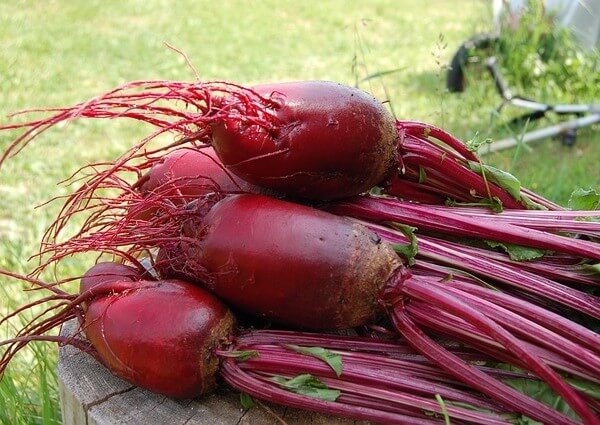
Taking a look at the nutritional profile of both raw Beets and cooked, boiled Beets, we can see that yes, Beets are indeed healthy for dogs.
Let’s go over why Beets (whether raw or cooked) are good for dogs.
Are Beets good for dogs?

Yes, Beets are good for dogs in moderation since this powerful food is jam-packed with nutrients and vitamins. Let’s discuss these vitamins and minerals in detail and see how they help benefit your dog’s health.
Beets are low in calories making them a healthy snack for dogs
Beets, with their low-calorie content, make a nutritious addition to a dog’s snack or diet. They are packed full of essential nutrients that can provide various health benefits.
However, if this is your pup’s first time consuming Beets, we recommend that you consult a veterinarian before introducing Beets into his diet.
That’s because individual dog’s needs and tolerances may vary.
CHECK OUT: Can Dogs Eat Horseradish? Is Horseradish Safe for Dogs?
Beets contain protein that allows your K9 friend’s body to function properly
Our dogs need protein so that their body can function properly. The protein in Beets contain essential amino acids which provide your dog with the following health benefits:
- Repair and maintain tissues and cells to provide your dogs with the following:
- Shiny and smooth coat or hair.
- Healthy and moisturized skin.
- Muscle development
- Healthy and strong bones.
- Support your pup’s immune system.
- Create enzymes, antibodies, and hormones.
Our furry family members also need protein because it provides them with the energy they need for the day. So when our K9 pals consume Beets, the protein in the Beets will help keep them healthy and strong.
Fun Fact: Amaranth and amaranth flour are also packed full of protein and contain all essential amino acids. Check out Can Dogs Eat Amaranth? to learn more!
Beets contain vitamins and minerals that are beneficial to dogs
There are plenty of essential minerals and vitamins in Beets. They are:
Calcium in Beets is an essential mineral that improves our dog’s overall health
Calcium is crucial to having strong and healthy teeth and bones. Our fur babies need calcium to grow and to form strong and healthy teeth and bones. It is an essential mineral that helps to maintain strong and healthy teeth and bones.
Additionally, calcium is responsible for the transmission of nerve impulses and cell signaling in your dog’s body. This allows your dogs to have a healthy nervous system.
Calcium also helps in building strong muscles and maintaining strong muscle function. When your four-legged friends are running around, playing, or even relaxing, their muscles are hard at work. Their muscles are contracting and expanding even when they are laying down on their comfortable doggy bed and relaxing.
Let’s not forget that calcium also helps to maintain a healthy heart in dogs and aid in blood coagulation.
As we can see, calcium is an essential mineral that helps to improve our dog’s overall health and happiness.
Magnesium in Beets allows dogs to move and think properly
One of the nutrients in Beets that is important to our dog’s health is magnesium. At the cellular level, magnesium is involved with energy production.
Our precious pooch needs magnesium in order to move, think, eat, play, sleep, and survive. That’s because magnesium enables the transfer of energy inside of your dog’s body which allows his heart to beat continuously, think clearly, or even move his muscles.
When a certain food, like Beets, contain magnesium, you’ll usually see these three minerals:
- Calcium. See above for more information.
- Potassium. See below for more information.
- Sodium.
These three important minerals rely on the job of magnesium and as mentioned above, are crucial for healthy heart functions, proper signaling of the nervous system, and flexible muscle movement.
If your dog has a magnesium deficiency, then these three minerals are also affected. Not having enough magnesium can cause calcium, potassium, and sodium levels to drop and this can be potentially dangerous to dogs since they may experience heart arrhythmias, muscle tremors, and overall muscle weakness.
Potassium in Beets is an electrolyte that is crucial to your dog’s overall health
Dogs need potassium to have proper body functions.
Not only is potassium a mineral, but it is also an electrolyte. This means that it is highly reactive with water. When potassium interacts with water, it dissolves and produces ions that are positively charged which allows it to conduct electricity.
Any time your dog is using their muscles or thinking, potassium is involved. That’s because potassium plays a huge role in muscle contractions, sending nerve signals, and regulating fluid in the dog’s body.
When you give your pooch a moderate amount of Beets, you’re also ensuring that he is getting enough potassium.
Fun Fact: Cheerios are also packed full of potassium, but is it safe for doggy consumption? Check out Can Dogs Eat Cheerios? to find out!
Iron in Beets helps with proper circulatory system function in dogs
Iron is another mineral that dogs need. Iron helps with proper circulatory system functions in dogs because it is directly responsible for producing both red blood cells and hemoglobin.
The red blood cells produce hemoglobin and hemoglobin in return helps to carry both oxygen and nutrients throughout the dog’s body.
When puppies don’t have enough iron, they become vulnerable to diseases and may have stunted growth. Older and senior dogs with iron deficiency may be vulnerable to sickness, stress, muscle weakness, and even constipation.
Also, iron helps with numerous enzyme functions in the dog’s body.
Beta carotene in Beets is a powerful antioxidant that helps to prevent infection in dogs
There are 20 µg in 100 grams of raw Beets and 21 µg in 100 grams of cooked and boiled Beets. Beta carotene is a carotenoid which is a powerful antioxidant. It is also a precursor to vitamin A.
So, are Beets good for dogs with cancer?
Having enough beta-carotene helps your dog’s body fight diseases, infections, and cancer.
Some of the diseases beta-carotene can help combat include:
- Eye disorders
- Immune system support
- Skin and coat health
- Cancer prevention
- Oxidative stress-related conditions
If your pooch has vitamin A deficiency, adding a little bit of Beets into their diet can help to improve their eyesight.
Vitamin A in Beets provides dogs with good vision
In 100 grams of Beets, there are 2 µg of vitamin A. Vitamin A is a fat-soluble vitamin that is essential for good vision in dogs as well as the following:
- Proper bone growth.
- Immune response.
- Cellular differentiation.
- Reproduction.
Vitamin B-6 in Beets promotes healthy brain function in dogs
Vitamin B-6, found in Beets, plays a significant role in maintaining a dog’s overall health.
This essential vitamin supports the nervous system, promotes healthy brain function, and aids in the production of red blood cells.
Adding a moderate amount of Beets into your K9 friend’s diet can help ensure they receive adequate amounts of this vital nutrient.
Vitamin C in Beets supports strong immune system in dogs
Vitamin C in Beets is essential for a dog’s immune system because it acts as an antioxidant. Antioxidants help to protect cells from damage caused by free radicals.
Additionally, Vitamin C supports collagen production, which is crucial for healthy joints, skin, and connective tissues.
Giving your pup a small amount of Beets can contribute to his overall health and well-being.
Are Beets bad for dogs?
Beets are bad if your dogs eat too much of them. That’s because Beets are high in oxalates so if your pooch has pre-existing bladder or kidney issues, try not to feed them too many Beets or don’t feed them any Beets at all.
Food like Beets that are high in oxalates can be a problem for dogs that are susceptible to kidney stones.
Also, Beets are considered acidic food. Some dogs may be sensitive to acidic food and may have loose diarrhea or may pass constant gas throughout the day.
Are Beets ok for dogs?
As we can see, Beets are ok for dogs in moderation since too much of them can have adverse effects on dogs. Before you feed your dogs Beets, make sure they are not allergic to Beets. If you’re unsure, consult your dog’s vet to find out.
If your four-legged friends have never had Beets before, start with a small amount and observe for any negative reactions. If they do have negative reactions from eating a tiny amount of Beets, do not feed them anymore Beets.
Are Beets safe for dogs?
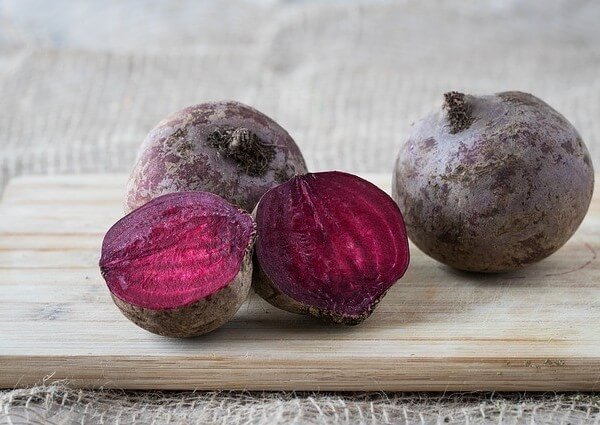
Yes, Beets are generally safe for dogs to eat when given in moderation.
Beets provide essential nutrients and are low in calories (as mentioned above), making them a healthy addition to your dog’s diet.
If you’re wondering how you can make Beets dogs safe, here are two crucial tips we want to share:
- Always offer plain, cooked Beets without added salt, sugar, spices, or oil.
- Chop the Beets into small bite-sized pieces to avoid choking.
As with any new food, it is crucial to introduce Beets gradually and slowly. You’ll want to monitor your fur baby for any signs of digestive upset or allergic reactions.
By keeping this in mind, you can provide Beets for dogs safely. treats that can benefit their overall health, making “beets safe for dogs” to enjoy as a nutritious snack.
So, can dogs eat Beets safely?
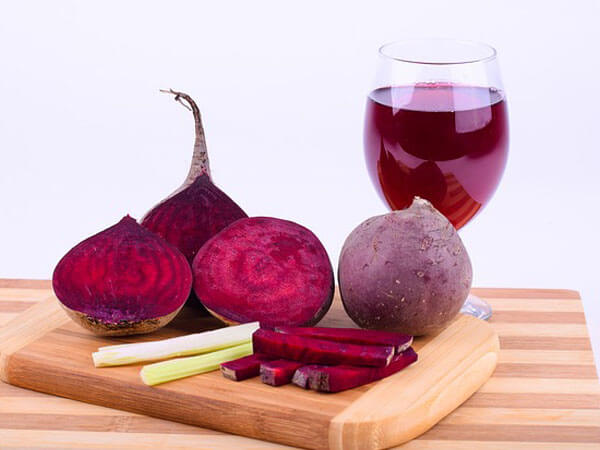
Yes, dogs can eat Beets safely when given in moderation and prepared properly.
To make Beets safe for canine consumption, we’d like to share these steps with you:
- Choose fresh, raw Beets without any added preservatives or additives.
- Wash the Beets thoroughly with cool water to remove any dirt or pesticides.
- Cook the Beets by steaming, boiling, or roasting them without adding any salt, sugar, spices, or oil. Cooking Beets makes them easier for dogs to chew and digest and reduces the risk of choking hazards.
- Cut the cooked Beets into small, bite-sized pieces that are appropriate for your dog’s size to prevent choking.
- Introduce Beets slowly and gradually into your dog’s diet. Start with small portions to monitor for any signs of digestive upset or allergic reactions.
By following these guidelines, you can safely offer Beets to your dog as a nutritious treat while minimizing the risk of potential health issues.
Dogs and Beets
Can dogs eat Beets raw?
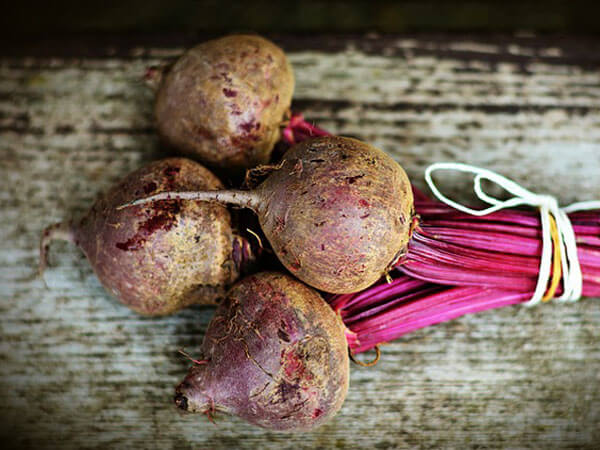
Yes, dogs can eat raw Beets in moderation as they provide our canine friends with tons of vitamins, minerals, and nutrients.
However, it’s important to note that raw Beets can be a choking hazard. They can get lodged in your dog’s throat or cause an obstruction in your dog’s small intestine.
For this reason, proper preparation is key before feeding your pooch raw Beets.
How to prepare Beets for dogs?
If you plan to feed your dog raw Beets, you’ll want to avoid cutting them into large chunks. Doing so can cause a choking hazard in dogs.
Instead, you’ll want to mash them down or puree them until they are consistently soft and easy to eat.
Puree and mashing process:
- You’ll want to cut the Beets into small pieces.
- Throw them into a food processor or blender.
- Puree until you see a consistent mash.
- Add the puree as a topper to your dog’s regular meal or serve it separately as an occasional treat.
Avoid seasoning the Beets puree. It’s best to keep them plain and simple. Some seasonings that we find delightful are actually toxic to dogs such as onion and garlic.
Can dogs eat cooked Beets?

Yes, dogs can eat cooked Beets in moderation and it’s the best way to serve Beets to our canine friends. To do so, chop them up into small pieces and then boil or steam them until they are soft.
Cooked Beets contain a similar nutritional profile as raw Beets so your furry friends will receive the same health benefits whether they have raw or cooked Beets.
Again, avoid feeding your dog too much cooked Beets or they may experience an upset stomach.
Can dogs eat boiled Beets?
Yes, dogs can eat boiled Beets when given in moderation. Boiled Beets provide a nutritious and low-calorie treat for dogs. They are also rich in essential vitamins, minerals, and fiber.
Boiling Beets is a safe and healthy way as it allows for easy digestion. However, some nutrients may be lost in the boiling water.
While boiling the Beets is good for dogs, steaming might be considered the best method because it preserves more nutrients than boiling.
Steaming also reduces the risk of overcooking the Beets, which can lead to a loss of nutrients.
Regardless of the cooking method, always ensure that you don’t add any salt, sugar, or spices while preparing Beets for your dog.
To avoid any digestive upset or allergic reactions, be sure to introduce the boiled Beets slowly and gradually.
Can dogs eat pickled Beets?
No, dogs should not eat picked Beets. Can dogs have pickled Beets? No, dogs should not have pickled Beets because when Beets are pickled, they contain way too much salt, and dogs that consume pickled Beets may be at risk of sodium poisoning.
Can dogs eat canned Beets?
Similar to pickled Beets, dogs should not have canned Beets as well.
Are canned Beets good for dogs? Canned Beets aren’t the best for doggy consumption. That’s because they also contain tons of salt which are not healthy or safe for K9 consumption and can also cause salt toxicity in dogs.
Symptoms of salt poisoning include dehydration, vomiting, and diarrhea to name a few.
For this reason, it’s best not to feed your dog canned Beets.
Can dogs eat Beetroot?
Yes, dogs can eat Beetroot in moderation. However, be mindful that Beetroot or simply Beets contains oxalates which are terrible for dogs with bladder issues and kidney stones.
Beetroot or Beets are also acidic which can give your pooch an upset stomach.
Before feeding your pooch Beetroots, make sure to prepare them properly. You’ll want to mash them or puree them or cook them until they are soft.
Is Beetroot safe for dogs?
Yes, Beetroot is generally safe for dogs to consume when given in moderation and prepared correctly.
Dog owners should select fresh, raw Beetroot without any added preservatives or additives. When preparing the Beetroot for canine consumption, make sure to clean it thoroughly to remove any dirt, debris, or pesticides.
Next, you’ll want to cook it by boiling, steaming, or roasting it without using any salt, sugar, or spices.
Cooking Beetroot makes it more digestible for dogs and eliminates the risk of choking hazards.
After cooking, slice the Beetroot into small, manageable pieces so it’s easier to eat and digest.
Do Beetroot benefits for dogs?
Yes, Beetroot do offer several benefits for dogs. They include the following:
- Nutrient-rich: Beetroot is a good source of vitamins (A, B, and C), minerals (potassium, magnesium, and iron), and fiber, which support overall health.
- Antioxidant properties: Beetroot contains antioxidants that help neutralize free radicals, reducing oxidative stress, and potentially lowering the risk of certain diseases.
- Supports liver function: The betaine in Beetroot helps maintain liver health by reducing the accumulation of fat in the liver.
- Boosts the immune system: The vitamins and minerals in Beetroot can help strengthen a dog’s immune system, making it more resistant to infections and diseases.
Can dogs eat red Beets?
Yes, dogs can eat red Beets. As mentioned above, red Beets are simply Beets. When people think of Beets, red Beets come to mind as they are the traditional form of Beets.
Can dogs eat Beet greens?
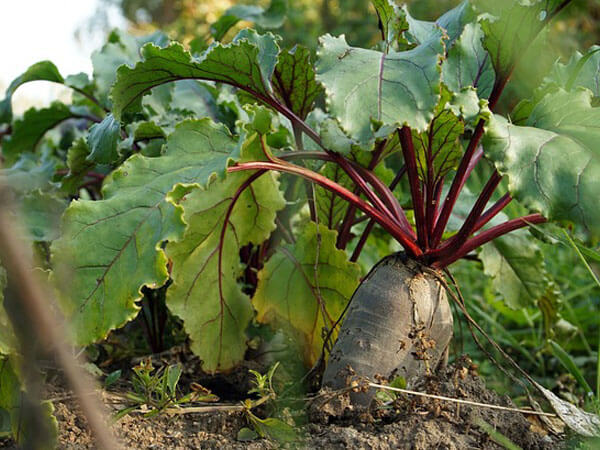
Yes, dogs can eat Beet greens in moderation, as they are a good source of vitamins, minerals, and fiber.
Beet greens are the leafy part of the Beet plant, growing above the Beetroot.
Before you give the Beet greens to your K9 friends, make sure to cook them first to reduce the risk of digestive issues. Cooking also helps remove the oxalic acid in Beet greens, which can be harmful to dogs in large amounts.
Can dogs have Beet greens?
Yes, dogs can have Beet greens when prepared properly and served in moderation.
As mentioned previously, Beet greens are the leafy part of the Beet plant. They are rich in essential nutrients like vitamins A, C, and K, as well as minerals like calcium, iron, and potassium.
These nutrients can support your dog’s overall health, including immune function, bone health, and blood clotting.
Can dogs eat golden Beets?
Yes, dogs can eat golden Beets in moderation. Golden Beets are a bit different from red Beets and they taste much sweeter. Make sure to give your pooch a tiny piece of golden Beets and see how they react.
Can dogs eat sugar Beets?
No, it is not recommended to feed sugar Beets to dogs, as they are high in sugar and are not as nutritious as red Beets.
Sugar Beets are a type of Beet specifically grown for their high sucrose content, which is extracted and processed to produce sugar.
They are different from red Beets, which are commonly eaten as a vegetable and have a lower sugar content.
While sugar Beets are not toxic to dogs, their high sugar content can lead to health issues if consumed regularly or in large quantities.
Consuming excessive sugar may lead to weight gain, obesity, dental problems, and even diabetes in dogs.
Instead, opt for red Beets as a healthier treat for your dog.
Can dogs eat Beet chips?
No, dogs should not eat Beet chips, as they are often high in salt and may contain added spices or flavorings that could be harmful to dogs.
Instead, consider offering plain, cooked Beets as a healthier alternative.
Can dogs eat roasted Beets?
Roasted Beets can be a healthy treat for dogs when prepared without added salt, spices, or oils. However, moderation is essential to avoid any potential digestive upset.
Can dogs eat Beet leaves?
Beet leaves are safe for dogs to eat in moderation. They contain essential nutrients that can support overall health.
However, it is crucial to monitor your dog for any signs of digestive upset or allergic reactions.
DON’T MISS: Can Dogs Eat Bay Leaves? Are Bay leaves bad for dogs?
Can dogs eat Beet stems?
Beet stems, like Beet leaves, can be safe for dogs to consume in moderation. They contain essential nutrients and can be a healthy addition to a dog’s diet when introduced slowly and gradually.
Can dogs eat Beet tops?
Beet tops, which include the leaves and stems of the Beet plant, are generally safe for dogs to consume in moderation.
They are a good source of vitamins A, C, and K, as well as minerals like calcium, iron, and potassium.
These nutrients support various bodily functions, including immune response, bone health, and blood clotting.
The high fiber content in Beet tops can help improve digestion and maintain a healthy gastrointestinal system in dogs.
Lastly, the antioxidants in Beet tops helps fight against harmful free radicals, reduce oxidative stress, potentially lowering the risk of certain diseases.
Can dogs eat Beet powder?
Yes, dogs can eat Beet powder in moderation, as it is derived from dried and ground red Beets. Beet powder for dogs is not only safe, but also nutritious.
Beet powder retains the essential vitamins, minerals, and antioxidants found in fresh Beets, providing similar health benefits.
However, when giving Beet powder to your dog, it is crucial to exercise caution and control the portion size.
Start with a small amount, such as 1/4 teaspoon per 20 pounds of your dog’s body weight, and monitor your furry friends for any signs of digestive upset or allergic reactions.
Can dogs drink Beet juice?
It is not recommended for dogs to drink Beet juice. Beet Juice is highly concentrated and may contain too much sugar for your pups.
Consuming too much sugar can lead to health issues like diabetes, pancreatitis, weight gain, and obesity.
Instead, opt for feeding your dog small amounts of cooked, fresh Beets as a safer and healthier alternative.
Can dogs have Beet juice?
As we can see, Beet juice for dogs is not a good idea and dogs should not have Beet juice. Consuming too much sugar can lead to the following health issues in dogs:
- Canine obesity
- Diabetes mellitus
- Dental problems (Buildup of plaque and tartar on the teeth, tooth decay, and bad breath)
- Digestive upset
- Hyperactivity
- Weakened immune system
Is Beet juice good for dogs?
While Beet juice contains essential vitamins and minerals, it is not recommended for dogs due to its high concentration of sugar and nutrients.
Excessive sugar intake can lead to health issues in dogs.
Instead, opt for feeding your dog small amounts of cooked, fresh Beets as a safer and healthier treat.
Can dogs eat Beet pulp?
Yes, dogs can eat Beet pulp in moderation. Beet pulp is commonly used as a fiber source in dog food.
Is Beet pulp good for dogs?
Beet pulp is good for dogs in moderation as it provides a source of easily digestible, soluble and insoluble fiber, all of which helps to regulate bowel movements and support digestive health in dogs.
When included as a part of a balanced diet, Beet pulp can aid in maintaining gut health and promoting overall well-being in dogs.
Is dried Beet pulp good for dogs?
Yes, dried Beet pulp is good for dogs in moderation. It retains the same fiber benefits as regular Beet pulp.
Dried Beet pulp is also easily digestible and contains soluble and insoluble fiber. This helps to aid in digestion and promotes gut health.
Can dogs eat Beets and parsnips?
Yes, dogs can eat Beets and parsnips in moderation. Both vegetables are rich in essential nutrients and can provide health benefits when included as a part of a balanced diet.
However, it is important to ensure they are prepared without added salt, sugar, or spices, and oil.
Be sure to introduce Beets and parsnips gradually and slowly and monitor your K9 friends for any digestive upset or allergic reactions.
Can dogs eat Beets and cabbage?
Yes, dogs can eat Beets and cabbage in moderation. Both Beets and cabbage are packed full of vitamins C, fiber, and antioxidants.
When adding both Beets and cabbage into your dog’s diet, make sure they are both prepared without adding any salt, sugar, or spices.
So, can dogs eat Beets?
In conclusion, dogs can safely eat Beets in moderation as part of a balanced diet.
Beets offer essential nutrients such as vitamins, minerals, fiber, and antioxidants that can support your dog’s overall health.
However, it is crucial to ensure Beets are prepared without added salt, sugar, or spices and introduced gradually to monitor for any digestive issues or allergies.
While Beet pulp and cooked Beets are safe and beneficial, it is best to avoid feeding your dog Beet juice due to its high sugar concentration.
As with any dietary changes, consult your veterinarian for personalized advice on your dog’s nutritional needs and to ensure Beets are a suitable addition to their diet.
DISCLAIMER: THIS WEBSITE DOES NOT PROVIDE MEDICAL ADVICE
The information, including but not limited to, text, graphics, images and other material contained on this website are for informational purposes only. No material on this site is intended to be a substitute for professional veterinary advice, diagnosis, or treatment. Always seek the advice of your veterinarian or other qualified health care provider with any questions you may have regarding dietary needs.
Resources:
https://en.wikipedia.org/wiki/Beetroot
https://www.ncbi.nlm.nih.gov/pmc/articles/PMC4425174/

With over five years of specialized experience as an animal writer, my expertise lies in dog nutrition, health, behavior, grooming, and training. I am dedicated to delivering helpful and informative content that caters to the well-being of our furry friends. My primary goal is to empower pet owners with knowledge and ensure our canine companions thrive in health and happiness. In my free time, I love volunteering at local dog rescue centers.
